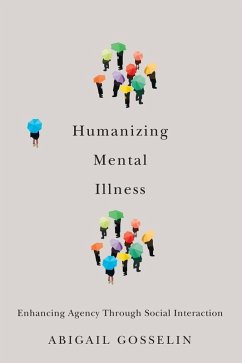Mental illness stigma is rooted in a perceived lack of agency, but stigma itself undermines agency. While most philosophical accounts of the matter are concerned with the question of how much agency a person with mental illness has, this book asks how we can enhance the agency of people with mental illness.Humanizing Mental Illness explains and explores these connections, arguing that all of us can and should adjust our social practices to enhance the agency of people with mental illness. This agency is complicated and nuanced, as it is often directly constrained due to a person's symptoms and indirectly constrained due to stigma. Abigail Gosselin, both a scholar in the field of social philosophy and a person with a psychiatric disability, illustrates the importance of social interaction for developing and exercising agency. By overcoming mental illness stigma and by adopting certain epistemic and moral virtues, we can interact with people who have mental illness in ways that help enhance their agency and enable them to flourish.Humanizing Mental Illness demonstrates that we need to challenge our explicit and implicit biases and learn to interact with mental illness in more intentional, supportive, and inclusive ways.
Dieser Download kann aus rechtlichen Gründen nur mit Rechnungsadresse in A, B, BG, CY, CZ, D, DK, EW, E, FIN, F, GR, HR, H, IRL, I, LT, L, LR, M, NL, PL, P, R, S, SLO, SK ausgeliefert werden.









